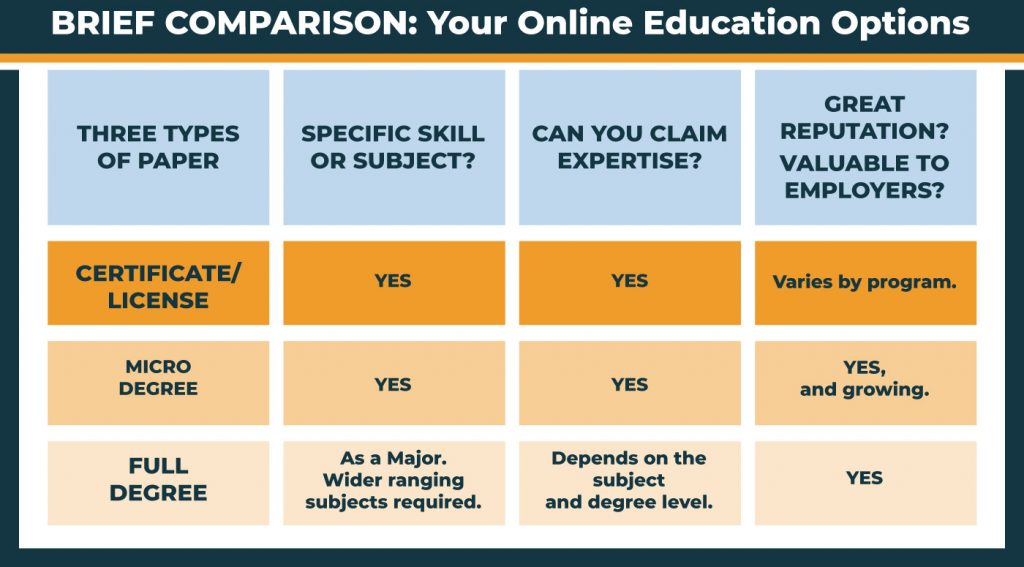You haven’t taken the leap yet, but you are serious enough about getting your online degree that you’re here. Good for you!
Excited?
Overwhelmed?
That’s normal. What follows will help. Right off, we recommend keeping one thing in mind: having options is a good thing. Colleges are competing for your education investment. That means you are the one in control.
Among your online education options are achieving formal certification for a specific professional skill, or college degrees, which have evolved into two major categories: classic degrees such as Bachelor’s and Master’s, and what are now being called “Micro” Degrees.
Blurring line between Certificates and Micro Degrees
Long before universities started offering realistic, useful online degrees, there were countless certificate and licensing programs of varying usefulness and repute. Now? There are more options than ever and it’s getting harder to tell the difference. It’s only a wonder the competition between universities and certificate programs didn’t get so large sooner. After all, universities employ the best teachers, know their subjects as well as anyone (except perhaps the professionals in the field), and are already geared toward putting their names on students’ degrees.
Brief Comparison: Your Online Education Options
Certificates
Our site is dedicated to online degree offerings in everything from sports medicine to computer science, all from the best accredited university programs, but if you know what career you are pursuing and have a specific idea of the skills required to advance rapidly, then it may be worthwhile for you to research certificates and licenses, too. In a matter of weeks or a few months, a highly reputable certificate in, for example, the IT field, can be a boost to your prospects and perhaps the best bang per buck per hour studying out there.
However, there are many certificates offered that sell themselves as highly valued, when no HR person has ever heard of them. Be wary. Dig. Be cautious of certificates that are not widely recognized in their field, not offered by highly reputable providers, or not verifiable by employers. The good ones might be very worthwhile, but they aren’t the same as a university degree, including a micro degree.

Micro Degree
The best universities are going online, fast. Prestigious universities are playing catch up with the online degrees HR managers used to scoff at. Their new challenger is the Micro Degree.
Micro Degrees are hyper-focused online degrees. They are designed to be immediately applicable to a very specific profession. They will teach you a practical skill set in a short amount of time.
Put simply: the difference between a typical undergraduate or master’s degree and a micro degree is the intense focus on a single, professionally applicable subject, with no separate course requirements.
In other words: for those looking to earn a better salary, micro degrees may be the wave of the future for education, and you are getting in just as they are exploding.
The Cost Difference
A full explanation of the differences between degree offerings could fill a book, and the playing field is still young enough that education offerings differ widely between universities and departments. Our site is a great resource for you to get started.
What clutters the simple descriptions above are those programs that say they will give you, for example, a Master’s in X subject, in a matter of a few short months. Micro degree offerings also range widely in time commitment and cost. Lastly, some high end certificate/licensing programs are intense and involved, and can take months to achieve. We are here to help, but in a changing environment you need to look out for yourself, and make sure you feel comfortable and well-served by the reputation and promises made by any online education provider, before you make the commitment of your time and money.
As to your out of pocket costs, and your time, again we are discussing a changing environment with massive variety. You might find some places offering what they call a micro degree for under $1,000. But, even if it seems obvious, we would be remiss if we didn’t repeat the old adage: you get what you pay for … usually. Some physical campuses now cost over $100,000 per year for tuition, room, board, and other expenses, and there’s legitimate debate going on over whether they are even close to worth it.
Yet many of them offer “need blind” admittance, financial aid, and federal student loan programs. Online universities are beginning to follow suit, and offer financial aid and financing options. And there are countless scholarship opportunities out there from a surprising variety and number of sources. In other words, as much as it would be nice to have a pat answer to the question, “How much will my online education cost?” The answer can vary almost as much as individual students and their financial statuses.
The point being, it would be easy to get lost in the weeds, trying to determine exactly what to expect in advance, so we suggest the best way to start is by focusing first on what you want to go after. This will narrow the scope of other variables dramatically.
At risk of repetition, we would only caution you to remember that you do not have to make a commitment to any program until you are absolutely comfortable with your decision. Their job is to get you so excited you wish you were attending classes yesterday. We can respect that. It is a thrill to improve ourselves and expand our knowledge, so why shouldn’t you get excited? Just remind yourself when you are researching online degrees, like any other business, they want to give you the “sizzle” before they tell you the cost. And once they do tell you the full cost, if it seems expensive, keep listening. There may be ways to qualify for a discount, scholarship possibilities, or other options to help make your online education a cost effective decision for your future.
Online Degrees and Magic Beans
You may not be able to predict whether your degree will be that key element to landing the job of your dreams, or just one good piece of a puzzle that still needs you to put it together. But we do believe that no matter what, it will open new, unpredictable doors for you.
In fact, our secret is we believe online degrees truly are like magic beans. But unlike fables, this life-pillar most likely won’t erupt from the ground at the speed of sound, just letting you throw a hook on it. The real magic happens over time, underground in a sense, as your new learning and expertise grow, before emerging into sunlight.
Forgive us! We get a bit flowery when talking about your education!
But we mean it. The truth is, the only way to predict how valuable your online program can be for you is by discovering what you want from it. And that will help you decide which kind to go after. The learning begins before you start the application.
Whichever direction you choose, there are phenomenal online degree offerings out there, backed by real professors and academic departments in top universities. The class-taking technology, study support, and ability to manage your time with your schedule is better than ever. And they want you.
If you’re not sure what you want to study yet?
Why not contact an HR department in a top company? Perhaps you are concerned about the impression you will make before you’ve earned your new degree? One technique we recommend that works during the college application process as well, is to make a list of several top companies where you could imagine yourself in a fulfilling career. If you have a list of five favorite organizations, then the one you might want to contact for information at this stage is the sixth—the one that didn’t make the list. It’s fair game, because you get to gain some knowledge, risk free, and they get a chance to make your own personal cut after all.
Your goal at this stage is to answer the critical question: What subject do I want to study, and what kind of degree do I want? Go to the company websites, read their job offerings and any career advice they offer, then call the main line of the one you want to speak with first, see if you can get a hold of someone responsible for hiring who will give you five valuable minutes of their time. Ask them what they most like to see in terms of education, specifically in regard to online degrees and micro degrees. Then do some really intense, dedicated listening. Even busy HR managers can get on a roll. People like talking about what they know, and they like helping other people. If you manage to get someone talking and giving you their time. Well done, it’s not easy to get a busy pro talking to a stranger. It’s valuable, so listen.
As the picture begins to get in focus, read our article on applying to online degree programs.
QUESTIONS TO HELP FOCUS YOUR OPTIONS
What do I want to be able to do after earning my degree that I don’t know how to do now?
Some questions you can’t answer fully until after you’ve learned new things, but however much you can answer in advance, may help you choose a specific course of study, and whether to go for a micro degree or broader undergraduate or graduate program.
Can I make a list of the best three books in the subject I want to study?
Some of those books may have been written by a professor in a department that offers the degree you’re looking for. Others may be taught as part of a course. We can learn from books on our own, but there is nothing quite so gratifying as finding a book you’re dying to learn as deeply as you can, and then discovering you can get help from an expert who will help you study it. This is the reason why some classes exist in the first place. A good professor can make sure you aren’t missing the best, most sophisticated parts of the material.
What have I always been good at?
This question gets easier to answer as we go. Not everyone is lucky enough to know what they are best at doing. You might have been a born underwater explorer and never had a chance to go snorkeling. But that kind of thinking can hold a person back, too, especially the younger you are. Sometimes the clues come to us from as far back as childhood.
“Follow your bliss” is an old saying. It comes from the right place, but may have the opposite effect on people than intended. Young people often read that as, “find out what makes you filled with hair-on-fire passion from morning to night!” But not everyone is geared that way. For many, bliss is not actually different from pure contentment, and is found through meaning. Meaning can be found through finding the right work, and not letting that work consume one’s every waking hour. That’s why the question is not, “What makes you shoot out of bed in the morning ready to go into orbit?!?”, but rather, “What are you good at doing?”
You might have five or more answers to that question. Examples are limitless: cooking, drawing, multitasking in a crowd of hustling people, reading, focusing for sustained periods of time, etc.
Odds are, if you are here, looking for an online degree, you’ve likely started thinking about this surprisingly difficult question. Which all comes right back to the first point we made: now is an excellent time to be doing this, and you are the one in control.





